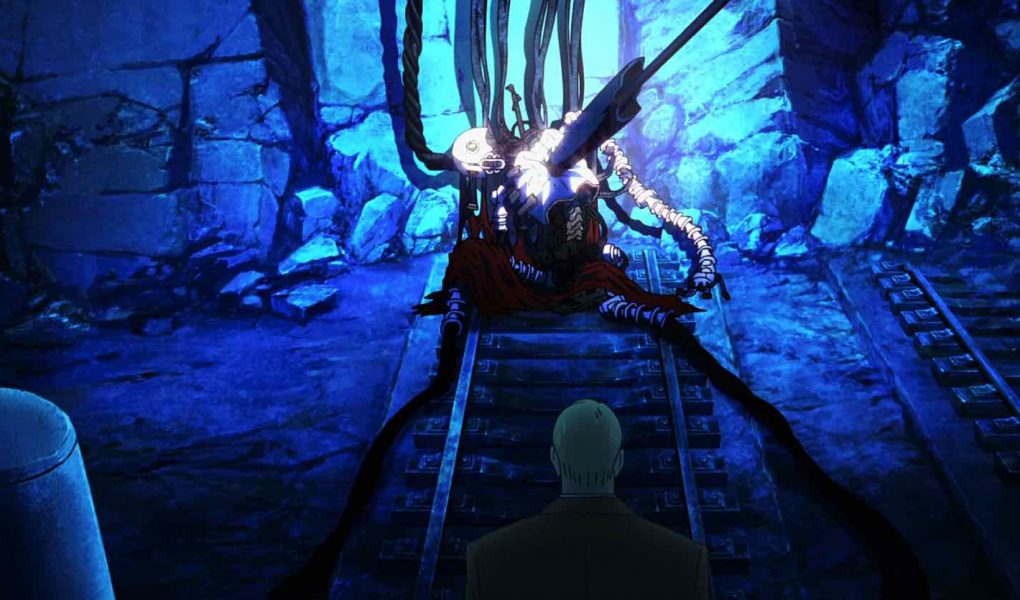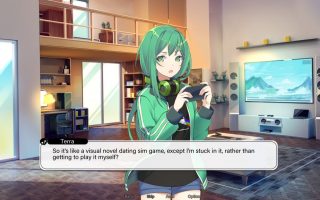The hard part of this kind of post is organizing my thoughts. It’s kind of a perfect storm. You have an absolutely stupendous masterpiece of a premiere, and on top of that it’s for one of the most-anticipated stories ever to be adapted to anime – both by me and generally speaking. I hardly know where to begin, and that’s not hyperbole. I guess I can say this much – if Netflix never produces another anime and had never produced one up to now (and there have been some damn good ones), the existence of Pluto would vindicate their involvement in anime. It alone makes it a worthwhile enterprise, and – no kidding – they have my sincere gratitude. ‘Cause it sure as hell never happened before they came along.
Ultimately it’s an emotional experience more than anything else. This was something most of us thought would never happen. And the credit all goes to Maruyama Masao, one of the most successful producers in anime, the founder of three studios (Madhouse, MAPPA, and M2), and once an assistant to Tezuka Osamu himself. Maruyama could have retired on the coattails of his glorious legacy years ago, but he had one dream that surpassed all others. He wanted to see the masterpiece that combined the talents of his two friends Tezuka and Urasawa Naoki brought to the screen. The production committee system stymied him, a brick wall. But he persisted, and eventually someone at Netflix – Goc knows who – listened.
That’s the most powerful part of this for me. He did it, and he lived to see the great passion of his life come to fruition. God damn, Maruyama deserves that too. Anime and its fans owe him a huge debt anyway, but to make this part of his legacy is a rare case of justice being served in the entertainment business. I had huge expectations for Pluto, not just because the source material is a generational classic but because of how long we waited with seemingly little reason for hope. Is there CGI here? Yes – but I don’t give a rat’s ass. If a few compromises had to be made, fine – and the one based on series length is of much more concern to me than that.
On that front, we’re getting eight episodes of an hour (sort of), equating to about 24-25 TV episodes. Maruyama wanted 39 – he got what he got. We know the lengths of all the episodes (yes, Netflix dumped the whole series, sigh) and they actually average out to a little over an hour. The premiere was 71 minutes in fact, albeit with a 4-minute end credit sequence. As always with a Netflix dump I face the dilemma of how to watch – and cover – Pluto. You think it was easy to stop after that episode – and cliffhanger? But I have a life and a job and a website to run, and I dislike binge viewing anyway – even when it’s not anime. Plus dammit, I want to make this last…
So for now, one episode – though with Atom appearing next, I’ll probably cave and watch another this weekend. As I said, I had huge expectations – but my expectations and fears were wildly divergent. That this premiere fully met those expectations is a little shocking, frankly, because meeting sky-high expectations is about the hardest thing for a show to do. The director is Kawaguchi Toshio, a legendary animator who’s played major roles on everything from Mononoke Hime to Evangelion, but had never directed a series before. An interesting choice by Maruyama, and I wasn’t wholly convinced by the first trailer all those months ago. But I am now. I am now.
Stylistically, if I were flying blind I’d have guessed this was Production I.G., and not Madhouse as you might expect from an M2 series. Kawaguchi has done major work at both studios – along with Ghibli and Gainax among others. His choices pretty much all click here, giving the material a chance to shine without unnecessary embellishments but imbuing it with that austere I.G. elegance. Music is used sparingly but plays a huge role, especially in the second chapter – composer Kanno Yuugo is a big name for a reason.
Now, plot… I almost don’t even want to get into it, or we’ll be here all day. Tezuka’s Tetsuwan Atomu is one of the all-time classics of science-fiction, and here it’s reimagined as a sort of film noir detective story by Urasawa Naoki. I mean, you’ve got the combined work of literally two of the top five mangaka of all-time in terms of stature. Both are writers of great depth and subtlety. There’s a lot going on here – Pluto is deep and complex, and so are the themes Urasawa is exploring here. In some ways it’s almost like A.I. Artificial Intelligence, the vision of Kubrick brought to life by Spielberg – and the themes being explored are not entirely different.
The long and short of it is that there are seven great robots in the world, set at an undefined time in the relatively near future. One of them, Mont Blanc – a “mountain guide” robot in Switzerland – dies under mysterious circumstances at the start of the story. Another of the seven is Gesicht (Fuji Shinshuu), now working as a detective for “Europol”. He gets assigned the case, and it’s a big one as Mont Blanc was a widely-beloved figure (and a peacekeeping hero). Gesicht also gets assigned a case in his hometown of Frankfurt, the murder of a robot-rights activist. Gesicht soon realizes the two murders are linked by the posing of the victims – one human and one robot – with what look like horns stuck through their heads.
There’s another murder in Frankfurt at this time – a “constable-bot” named Robbie. That turns out to be something of a red herring, as it was the act of a junkie in a paranoid rage. But Robbie witnessed something odd in his final moments, as Gesicht finds out when he brings Robbie’s memory chip to his wife. This is a wonderfully constructed sequence by Urasawa and Kawaguchi, starting with Gesicht discovering Robbie’s body about to be “disposed of” in the trash crusher. Despite their very robotic appearance (in contrast to Gesicht) Robby and his wife were clearly a true couple, with true emotions. The moment when Gesicht inserts the memory chip into Robbie’s wife is quite an emotional and disturbing one.
The activist’s death is mysterious especially because Gesicht can find no traces of another human having been in his apartment, and robots are supposedly unable to kill humans. Searching for answers, Gesicht goes to visit the only robot ever known to have done so, eight years earlier – Braun-1859 (Tanaka Hideyuki), impaled on a spear in an underground wasteland. This cat and mouse is straight out of Silence of the Lambs, and the entire Gesicht section has a kind of film noir quality to it (which is mostly down to Urasawa). It’s fantastic – and so is Fuji Shinsuu, hardly a household name in anime. I loved him in Nami yo Kitte Kure and he absolutely nails it here.
That said, the second half of the episode is (almost unbelievably) even better. It chronicles the final months of another of the seven great robots, North No. 2 (Yamadera Kouichi, who’s pretty much always brilliant). A former military robot who destroyed thousands of his own kind in battle, he’s been sent to the castle of award-winning composer Paul Duncan (Hazama Michio, also superb). Duncan is old, blind, and bitter as a goya melon. He verbally abuses North from the moment he arrives, heaping disdain on him for his bloody past. Duncan has great contempt for technology, this is obvious, and eschews the synthesizers and mixers in his studio for his old-school piano (which North immediately takes an interest in).
This whole chapter is so delicate and melancholy that I feel like I’m cheapening it by analyzing it. Both North and Duncan have things they want to forget and can’t. North involves himself in Duncan’s struggles against the man’s best efforts, and won’t be dissuaded. He even goes to Bohemia to hear the folk songs of Duncan’s childhood, trying to find the melody the old man hums in his sleep. North can find the beauty hidden in Duncan’s nightmare, even as he knows there’s no such redemption in his own. Kanno’s (correction: this piece was composed by Manabe Akihiro) gorgeous melody provides the backdrop to all this, and it comes together beautifully.
We know how this is going to end, of course, though that does nothing to lessen the pain when it does. Urasawa’s story it structurally a mystery, but it’s underpinned by themes of loss, regret, and loneliness. And he takes dead aim at the real-life scourges of human society, most especially racism. Urasawa doesn’t hit you over the head with this sort of thing, he’s far too subtle for that, and he never allows those themes to smother the human side of the story. And it’s only at the very end of the episode that Pluto’s – and Tezuka’s – most iconic character makes an appearance.
It’s all, in a word, great. A masterpiece of an opening for a series which shows every sign of being a strong contender for AotY even in a year as good as this one in anime. We still have seven more episodes to go of course, and the issue of pacing still hangs over Pluto as a legitimate cause for concern. But for the first ep to be the unabashed triumph it is, to stare down those massive expectations and surpass them, is pretty astonishing. For Pluto to have been worth the wait when the wait was as long it was is the sort of success story we almost never see, and I want to savor that for as long as possible.
The post First Impressions – Pluto appeared first on Lost in Anime.




